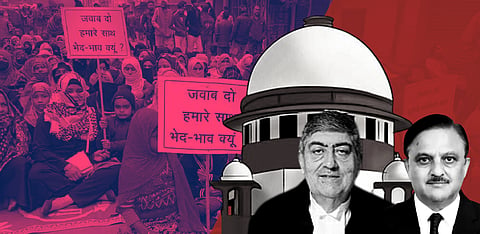

Observing that thousands of people couldn't be uprooted overnight or without any rehabilitation plan in place, the division bench of Justices S.K. Kaul and A.S. Oka also expressed displeasure at the high court's direction asking for the use of paramilitary forces to dispossess the occupants.
—–
THE Supreme Court on Thursday came to the rescue of over four thousand families, staying the Uttarakhand High Court's order directing their dispossession within seven days from 29 acres of railway land in Haldwani.
A division bench comprising Justices Sanjay Kishan Kaul and Abhay S. Oka observed that thousands of people couldn't be uprooted overnight, even as it expressed displeasure at the high court's direction asking for the use of paramilitary forces to dispossess the occupants.
The bench was of the view that the issue at hand required to be dealt with from a humane angle since the occupants had been living on the disputed land for a long time. It also wondered how occupants could be evicted without a rehabilitation plan in place.
The bench, however, made it clear that though there would be a stay of the high court's directions, there should not be any further construction or development on the disputed land. Besides, the proceedings which are pending under the Public Premises (Eviction of Unauthorised Occupants) Act, 1971 would continue.
"A workable arrangement is necessary to segregate people who may have rights/no rights coupled with schemes of rehabilitation which already exists while recognising the need of the railways", the bench noted in the order.
Additional Solicitor General Aishwarya Bhati sought to contend that due process was followed in the matter. She further said that land was necessary for the development of railway facilities. Justice Kaul who was heading the bench remarked that the land might be belonging to the railways, but people could not be dispossessed without rehabilitation.
Senior advocates Colin Gonsalves, Siddharth Luthra and Salman Khurshid, and advocate Prashant Bhushan appeared for the petitioners.
Gonsalves referred to a previous order passed by the Supreme Court in 2017 in which it was recorded it was not clear whether the land in question indeed belonged to the Railways.
On December 20 last year, a division bench of the high court comprising Justices Ramesh Chandra Khulbe and Sharad Kumar Sharma directed the railway authorities in coordination with the district administration to immediately give notices to the occupants asking them to vacate the land. The high court had rejected the claims of the occupants that the land was nazul land.
"Under the Urdu terminology, the nazul land means a land, which is commonly called as "jaayajaad munjaapaata", which means a land, which was left by the principal occupier, as an act of rebellion of Mutiny of 1857, which was later on vested with the Queen. Since no act of Mutiny of 1857, had ever taken place in the Haldwani Khas, so created in 1834, no part of the 166 land of Haldwani Khas, would be said to be "jaayajaad munjaapaata", to be termed as a najul land", said the high court explaining the meaning of nazul land.
The occupants' claim that the land is nazul land was based on an official communication that dates back to 1907. Rejecting the argument, the high court said document was only "an official communication, it will not have a statutory force".
The high court also held that the rights claimed by the interveners or the occupants were based upon an Office Memorandum of 1907 which would not confer any right as it only referred to the management of the property to be in accordance with Nazul Rules.
The high court's ruling, if given effect, would result in the demolition of houses, schools, temples, banks and mosques, against which protests have going on in Haldwani city by the occupants.
In its order, the high court had accused the state government of filing a review petition against the high court's original eviction order "for no subsisting or valid reason" "[o]wing to the certain most reckoned political shield, which was then being provided by the then Ruling party for its political gains to the unauthorised occupants, just to secure its vote bank".